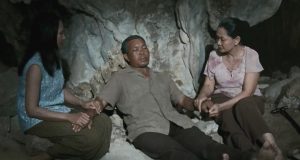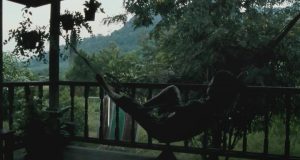Honestly, I have never searched for Thai films. I did not even know if they have so many, to begin with. I was not interested in Thai films, but after watching Uncle Boonmee Who Can Recall His Past Lives (2010), I will surely look for more.
I chose this movie because I started to look more into cultures that I ignored for quite a while, but also because of the premise, the poster, and some stills that looked too good to be missed out on.
Unless you are familiar with arthouse films, probably the name Apichatpong Weerasethakul does not tell you something. Maybe there is a chance that you have heard about Tropical Malady, Cemetery of Splendor, Syndromes and a Century, or Blissfully yours.
If you are still puzzled, don’t worry. That is how you should feel! At least, that is what this film is about.
Okay, what’s the plot?
It’s what you have read. The title. Uncle Boonmee suffers from kidney failure, and we watch his last days (or hours, or weeks?) on earth, how he tries to make peace with his violent past, and his past lives.
What’s so good about it?
#1st thing: storytelling
As you read, the plot is rather simple, but how it is told might give you a headache. It is weirdly calming. Weirdly simple. Weirdly touching. Weirdly fit. If you let yourself be immersed in the thoughts and actions of the characters, you will see that everything makes sense without having logic.
To put it short, Uncle Boonmee Who Can Recall His Past Lives is a film that is a combination of dreams, surrealist elements, and magic realism.
And it works wonderfully. Usually, it takes a lot of courage and a keen eye to make the strangeness feel normal and to plunge into the soul of people. It’s like jumping from one place to another.
#2nd thing: cinematography
Everything is on point. The film consists of long takes, by that I mean, continuous long takes. It such a calm feeling to see how the camera is moving slowly from one frame to another and stays there for 10 or 20 minutes. Slowly filmed, magnificent crafting.
Then there is the lighting. Being mostly filmed in nature, there is a lot of natural lighting in Uncle Boonmee Who Can Recall His Past Lives. Due to the natural lighting, every shot has its own uniqueness. It feels as if every frame has a new lighting set-up. The transitions are so smooth from one frame to another that it provides a calm atmosphere.
Here’s your aesthetic.



#3rd thing: how natural everything is
The dialogue is plain, important questions that seem small talk. Casual talk, so to say. The actors seem like casual people, people who suffered and lost but also gained something. Honestly, I would not be surprised if the actors aren’t even actors, just random people who fit the roles.
The acting is the other reason for which I appreciate this Thai film: it’s hard to make actors that look like they feel something without all the acting that you see in standard productions.
The atmosphere is also soothing, comfy, a bit mysterious at times, dreamy, nonetheless natural.
What not-so-good about it?
I think the director and the crew nailed Uncle Boonmee Who Can Recall His Past Lives. But, from what I’ve discussed with people that saw the movie, the lack of coherence seems to be a downfall.
In my opinion, the idea of the movie is not to find the logic, not to question everything, but simply to go with the flow. Accept life and death as they are because you will see them differently when you are on your deathbed anyway.
Let yourself be the victim of mythology, religious ideas, folklore and see how do they play a role in your life, and your dreams. Not everything is logical, after all.
Another thing that people found a bit discouraging is the fact that the film is immersed in Thai history and Thai culture. To understand some symbolic scenes, it felt like they should’ve read about Thai history or culture (which may be true, I did not experience it myself as I know some general facts about Thailand).
Of course, the last (which is a bit ironic): it’s an arthouse Thai film.
Now, arthouse film means a movie that ‘is intended to be a serious work of art rather than a popcorn flick’.
That is why Uncle Boonmee Who Can Recall His Past Lives is made of long takes, and it is a slow film. A slow film means a film where the action takes a lot of time to happen. That varies from movie to movie. That’s another reason why the movie jumps from one thought to another, and it combines so many narratives.
If you do not like movies where ‘nothing happens’ (as in no action, or it is not a thriller, horror, etc.), that is so slow that you might fall asleep, and it simply feels ‘too boring’, don’t watch Uncle Boonmee Who Can Recall His Past Lives.
But if you love art, you want to explore a culture so different from yours, and you want to have your brain constantly working on interpretations, give it a chance!
Or watch it if you want to see a Thai film that is like a Murakami book combined with Lynch’s filmmaking style (more or less, depends on what you have read or watched from them). Have you ever heard of Tarkovsky? It might be the right choice for Tarkovsky enthusiasts too.
Do you want something else? Then check Kids return and The Vanishing.







